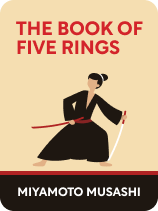

This article is an excerpt from the Shortform book guide to "The Book of Five Rings" by Miyamoto Musashi. Shortform has the world's best summaries and analyses of books you should be reading.
Like this article? Sign up for a free trial here .
Who were the Samurai and what was their job? Do the Japanese Samurai still exist?
The Samurai were the warriors of premodern Japan whose role was to defend territories and fight enemies of the authorities. While the Samurai have ceased to exist as an active force, samurai principles still apply to some modern martial arts contexts. In his book The Book of Five Rings (The Wind Book), Miyamoto Musashi highlights two such principles: know your competitor and use skill over strength.
Here’s how the samurai principles apply to the modern-day.
The Wind Book
Having shared his views on what the fundamental principles, mental and physical training elements, and battle strategies are for the Way of the successful warrior, Musashi now shifts his focus in the Wind Book toward the approaches of some of the other rival schools of his day. He critiques other sword-fighting methods and discusses technical details such as how to move your feet during combat, use speed, and use different sword-lengths.
While these discipline-specific critiques don’t hold much meaning for the more general modern reader, we’ve identified two enduring samurai principles that Musashi offers: Understand your competitor’s strategies and use skill over strength to ensure your own success.
1. Understand Your Competitor’s Strategies
In describing and picking apart the strategies taught by rival martial arts schools, Musashi isn’t being petty. He explains the weaknesses he notes in their strategies to show how he avoids such weaknesses in his own approach to the true Way. The same strategy also applies to the warrior when in combat: To outwit your competitor and strengthen your own position, you must first thoroughly know your competitor.
| Sun Tzu on Outmaneuvering the Enemy Musashi urges the warrior to observe the enemy carefully to outwit him and gain the upper hand in combat. In the fifth book of The Art of War, Sun Tzu also outlines more specific tactics for determining your enemy’s position and outmaneuvering them in combat. Sun Tzu’s advice includes: -Take the initiative to gain the upper hand. -Observe your enemy carefully, to detect the weak spots. -Turn the enemy’s position against him once you know where the weak spots are by using them to your own advantage. Examples could include attacking him when he isn’t expecting combat, or by laying siege when he is short on supplies. -Keep comparing your enemy’s troops and position to your own. -Speed is key: Advance quickly on the enemy when you sense his position weakening; be as rapid as possible when you yourself have to retreat. -Keep your troops together as a whole while forcing the enemy to break into smaller units. -Be willing to modify your own tactics in response to your opponent’s strategies. |
2. Use Skill Over Strength for Success
Musashi argues that too many warriors believe that brute strength alone can guarantee success in combat: They think the strongest warrior always wins. Musashi counters this belief with the argument that the smartest and most skillful warrior wins—brute strength alone is never enough.
(Shortform note: In such passages, Musashi appears to be implicitly criticizing rival schools who emphasize physically overpowering your opponent.)
Throughout the book, Musashi has mentioned instances in which a small army was able to overpower a much larger one, simply due to their better strategy and morale. By relying on his rigorous training and knowledge of strategy, physical and mental equilibrium, superior perception, and ability to adapt to any circumstance, the successful warrior will be able to win even against the strongest of enemies.
| Skill Trumps Strength in Combat and Sports Martial artist Lawrence A. Kane argues that skill is more important than strength in martial arts. Kane also draws on some historical examples to prove his point more generally. In the famous showdown between the Spartans and Persians at Thermopylae (480 BC) during the Persian Wars, the Spartans were vastly outnumbered. And yet, because they were more skillful warriors and knew how to use both the terrain and their fighting techniques to their advantage, they managed to hold the narrow pass at Thermopylae against the invading Persians for several days. In the end, the Spartans were defeated only because they were betrayed by a defector to the Persian side, who showed the invading army a way around the pass. It is, however, also interesting to note that some studies show that cognitive strategies in sports can affect strength in athletes. These strategies include setting goals, mental preparation, and visualization, and some correlation has been observed between the use of these strategies and increased strength performance. Such research suggests that while Musashi might not see strength as a determining factor in combat or competition, it can nevertheless be a positive by-product of the sort of mental discipline he advocates. |

———End of Preview———
Like what you just read? Read the rest of the world's best book summary and analysis of Miyamoto Musashi's "The Book of Five Rings" at Shortform .
Here's what you'll find in our full The Book of Five Rings summary :
- Insights from the famous Samurai Miyamoto Musashi about the Way of the Warrior
- How to apply Musashi’s teachings to your personal and professional lives
- Why success is not based on brute strength or innate talent






